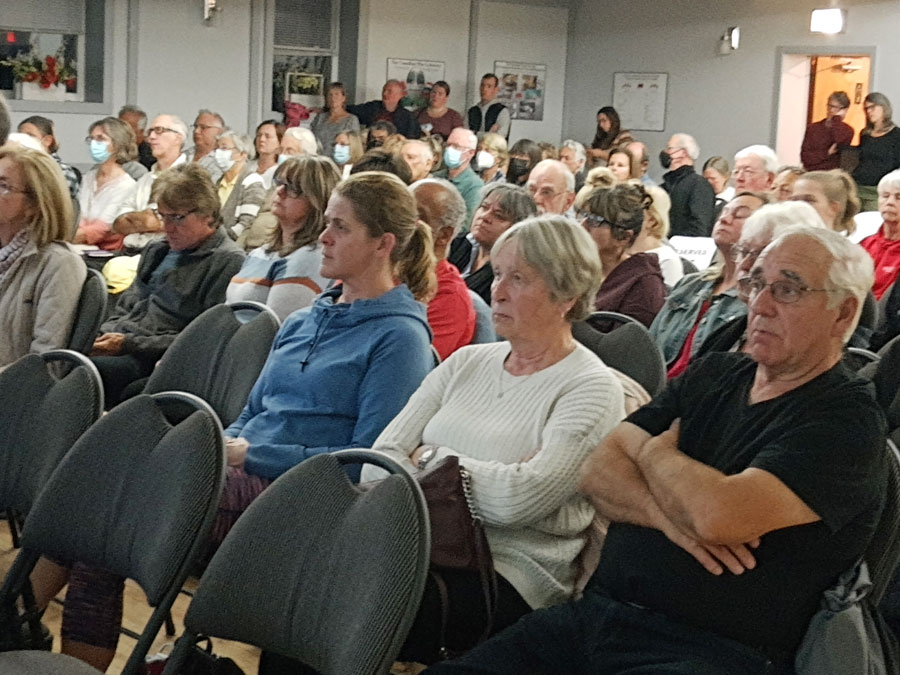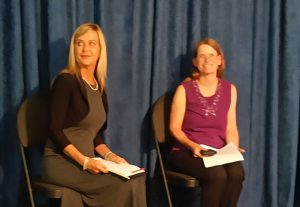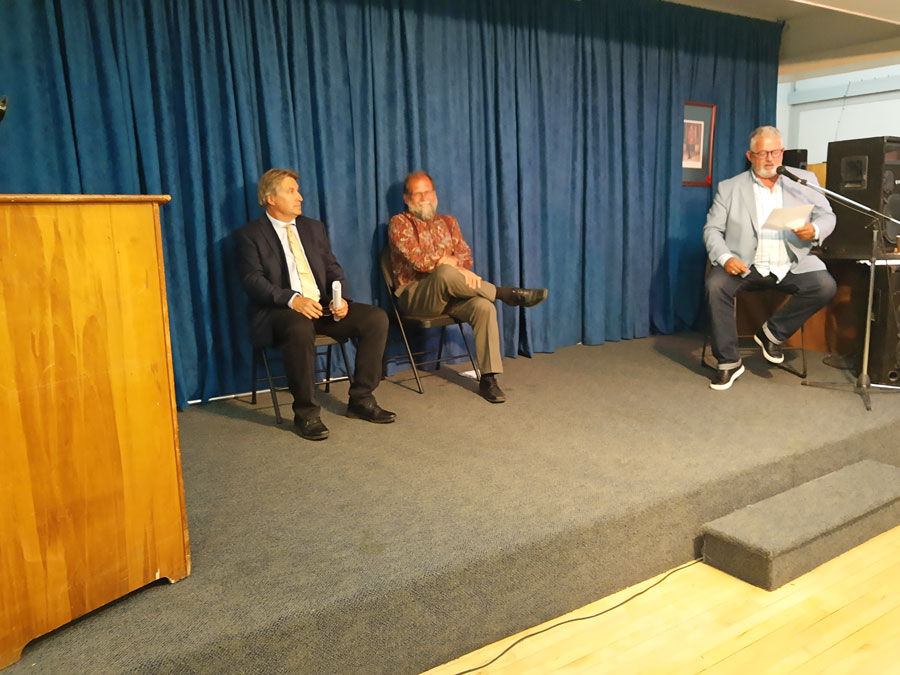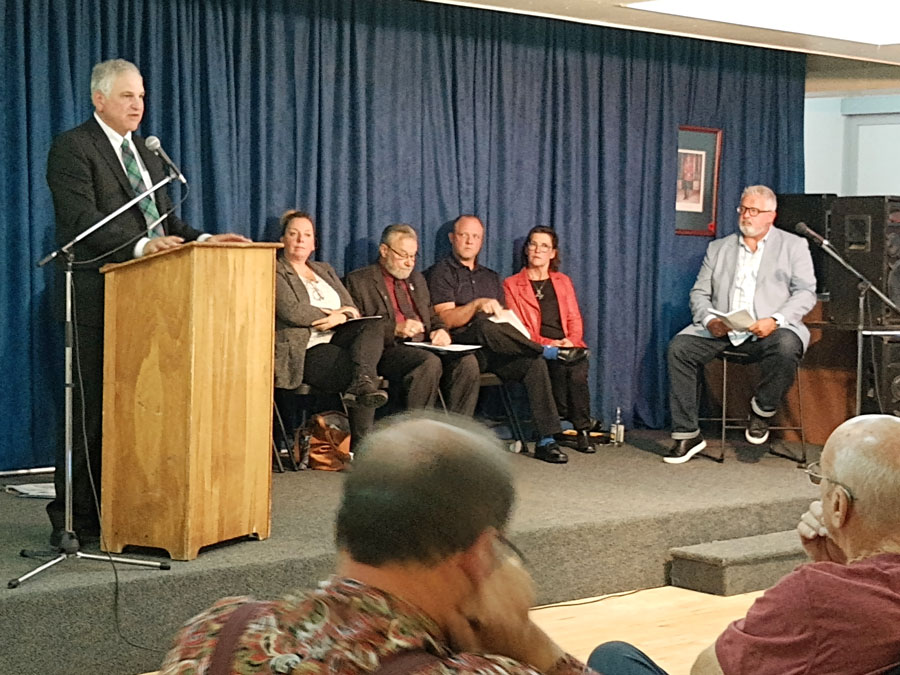ERIN – Attendees heard a lot about growth from candidates at a municipal election forum at the Erin Legion on Oct. 4, and not many opposing opinions among them.
All the candidates running for council and mayor seats in the Town of Erin’s upcoming municipal election seemed to accept that growth is coming, that the much-maligned wastewater treatment plant can’t be stopped, and that the task at hand for the next council is to control growth and balance it with infrastructure projects to keep pace.
But they distinguished themselves in other ways and the audience of about 150 seemed eager to hear the candidates speak for themselves.
Six candidates are vying for four town council seats: Cathy Aylard, Val Bush, Kevin Johnson, Bridget Ryan and incumbents John Brennan and Jamie Cheyne.
Michael Dehn and Rob Smith are duking it out for mayor. And Lynn Clack and incumbent Jennifer Edwards are running for the Upper Grand District School Board trustee spot.
Each candidate got two minutes for opening and closing remarks. Council hopefuls had the same three questions to answer; mayoral candidates had those three plus one specific to the mayor job. The two Upper Grand District School Board trustee candidates had two minutes to introduce themselves and explain their platform. They fielded no questions.
About 150 people attended the meeting and moderator Rob Wright, a member of the Erin Chamber of Commerce, which hosted the debate, told the Advertiser during a break that he’s glad the audience was positive and well-behaved after some heated comments on community Facebook sites.
“We didn’t know what to expect tonight,” he said.
Rob Smith, a current councillor who is running for mayor, also alluded to the online vitriol.
“If you believe Facebook, it’s like I’m running for first place in an abusive relationship,” he said.
Each of the candidates, excluding trustees, were asked the following questions:
- What skills do you bring to the position?;
- How would you make Erin more business-friendly?; and
- What is your plan for Erin to be prepared for growth before subdivisions are built and a new population arrives?
In addition, because the mayor also sits on county council, the mayoral candidates were asked how to get more value from the county portion of the property tax bill.

About 150 attended a candidates meeting at the Erin Legion. Photo by Joanne Shuttleworth
Jamie Cheyne
Cheyne has served one term as councillor and listed four main accomplishments in that term: the wastewater treatment plant has begun; they developed urban design guidelines; there’s a Parks and Recreation Master Plan; and stable funding for community organizations.
He has also served on the heritage committee, Let’s get Hillsburgh Growing, the farm board, and the Hillsburgh Baptist Church.
“I try to get involved,” he said.
Cheyne noted the town recently hired an economic development officer whose job it is to hear concerns of businesses and find ways the town can help.
The role is to “draw big business,” he said.
He said growth will benefit local businesses and also ensure there are schools and seniors’ residences in Erin, so there’s a place for everyone throughout their lives.
New residents will strengthen the community and add to the sense of community that is so cherished, he said.
“With a strong council and mayor, we can keep a small-town atmosphere,” he said.
Kevin Johnson
Johnson and his family moved to the area from Milton 10 years ago to get away from the rapid growth in that town. So growth in Erin is among his top concerns.
Increased traffic and keeping streets safe for children, and the need for infrastructure to come before development are also high on his list.
“We have to manage growth – really manage it,” he said. Having infrastructure in place before new residents arrive “is unbelievably important.”
Johnson said he’s been a business owner for 11 years and has gone through the “ups and downs” of the pandemic and the economy like everyone else.
That experience has afforded him some skills that will translate to the horseshoe, “but as a resident, we all are qualified to run,” he said, adding “My gentle nature makes me easy to talk to.”
He said there’s a disconnect between business owners and municipal government.
“There’s a lot of red tape,” he said. “The two sides need to understand each other.”
Cathy Aylard
Aylard is known locally as the ‘dahlia lady’ with a business background and experience as a project manager. She also attended the local municipal campaign school where a piece of advice really resonated, she said.
“We are given two ears and one mouth. Use them in that ratio,” she said. “I will listen and find solutions.”
She said she’s passionate about small business and supporting local first.
Understanding growth and how to get ahead of it is more complicated, she acknowledged.
She views it as three cogs in a wheel – having the quality of life we want; economic development and growth; and protecting the environment.
“In the middle is budget and finance,” she said. “But it all rolls back to having a strong plan and putting it into action.”
It will take a strong leadership team to preserve the best that Erin has, she said.
“Let’s mix up the conversation, let’s have a different point of view. I’ll be the voice asking why, what if, and why not.”
Val Bush
Bush is another candidate who moved to Hillsburgh to escape the rapid growth of Milton.
“I’m not a fan of super growth,” she said. “You need amenities in place.”
She said Milton did it backwards – where homes were built and occupied long before roads and other infrastructure was addressed, making Milton a chaotic and frustrating place to live.
She’s been a public servant throughout her 26-year career, 19 of those as a civilian with the OPP. She also volunteers on the school parent council and is president of the local skating club.
She brings commitment to the community, a high level of integrity and has good people skills, she said.
To support local business, “we need to capitalize on what we already have,” she said. That includes highlighting local trails, rural tourism and other features and advertising that through tourism initiatives.
She suggested extending the farmer’s market by a couple of months and offering grants to help businesses spruce up exterior facades would also benefit the tourism market.
She said the cost of upgrading roads should be pushed on to the developers.
“We have to hold them accountable for our bridges and roads,” she said.
Bridget Ryan
Ryan sees many challenges ahead for the next council and if there is responsible growth, it’s possible to address them all. Preserving heritage is a “no-brainer” she said, so are preserving natural spaces, addressing climate change, and encouraging agri-tourism.
“I want to move the town forward in a thoughtful manner,” she said.
She has a marketing/communications background, Equine Erin is her bag, and she’s been involved on numerous boards and organizations in her 23 years in the town.
She supported staggered growth rather than have it happen all at the same time. And she spoke about the main streets of Erin village and Hillsburgh and the need for a bypass to keep those streets safe for pedestrians and visitors.
“I believe we have the opportunity to do something different… but we need to look at growth and make sensible decisions,” she said. “I will stand up for our values. We could be a community that thrives.”
Ryan said Erin will be stronger if it connects with the other municipalities in Wellington County to become one single voice – on tourism for example, and other shared concerns.
John Brennan
Brennan has served seven terms as a councillor and had a long career with Dupont as well where he had to liaise with various government and advocacy groups.
“It requires skill to have good relationships. Those are the skills you need to do (the council job) well,” he said.
Brennan said having an economic development officer on township staff has already been a benefit to local businesses and that will only get better.
He believes growth will be good for the community in the long run, creating a larger customer base for businesses and more job opportunities for residents.
“However, we must control growth and preserve our values and quality of life,” he said.
He noted that when Erin hits its growth targets, it will be the size of Fergus in 2016. Increasing the tax base will allow the town to make more road repairs and recreation improvements.
But the size of Erin is not the source of its charm.
“It’s the quality of life, and it’s the people,” he said. “We won’t lose that unless we give it up.”
He said development must pay for growth and that developers have already paid $23 million above the cost of building the wastewater treatment plant.
But the cost to homeowners to hooking up to the town’s system should not be prohibitive, he said.
“It will be the job of council to leverage a plan.”
Upper Grand District School Board trustee candidates
“Families want their kids happy at school and safe when they arrive,” said Lynn Clack and that understanding would guide her decisions as a trustee.
She said mental health is a huge issue for the board and that behavioural issues are on the rise.
Transportation is a barrier to rural students accessing some board programs, like the International Baccalaureate (IB) program.

Lynn Clack, left, and Jen Edwards, candidates for UGDSB trustee representing Erin, Guelph/Eramosa and West Garafraxa, discussed their vision of the meeting hosted by the Erin Chamber of Commerce on Oct. 4. Photo by Joanne Shuttleworth
And, “I’d like to see basic fundamentals back in the classroom,” she said.
Incumbent Jen Edwards raced through her speech to include all her priorities and involvements in the community.
But at the root of it all is environmental sustainability, equity and providing opportunities for students to thrive, she said.
The mayors
The only heated moment of the evening came at the end when mayoral candidate Michael Dehn expressed that he had been holding in frustration the whole evening.
“I’m not ranting as much as I feel,” he said. “I’m trying to keep it under control.”
Stormwater management is his top concern. Run-off from the new subdivisions could cause flooding downtown, he said.
He thinks the town should develop a system for collecting and using grey water and that residents with septic systems in working order should not be forced to hook up to the municipal system. But if they are, the costs should be as low as possible.
Dehn said he wants to ensure there is enough clean drinking water for the growing town. There needs to be a bypass around the village of Erin to keep traffic out of the core, and he called the town office “a revolving door of staff,” adding that a senior financial officer recently left the town.
“The fourth quarter financials are due and I’m not sure we have the first quarter financials,” he said.
He said he can read financial statements, but the town’s “are so consolidated, you don’t know where the money is going.”
He said the town should ask developers for land and use it to develop a business park and sell the lots as revenue.
Internet and GO bus service also need to come to town, he said.
The county has too much control over the town when it comes to growth and development, he said. No affordable housing projects have been proposed for Erin, but it’s needed here too, he said.
“I’m frustrated that the funding is decided in Guelph (Wellington County administration centre) while residents here don’t get a say. I’d like it to change,” Dehn said.
Rob Smith has been a councillor for eight years and feels that and 40 years as a business owner have prepared him for the hot seat.
“I have a lot of insight and knowledge,” he said, adding he also sat on a number of committees and boards over the years.
He said there’s a good economic development committee at the town that is connecting with businesses. A new online permit system will help businesses and getting the wastewater plant up and running will be a boost for business too.
He thinks when the town starts to grow, the county will open its pocketbook and fund more projects here.
“We are poised and in a good position with this growth,” he said. “Other municipalities have taken growth for a long time and I think we can leverage this with the county, I think we can get a lot more out of them.”
Smith intends to pay more attention to rural residents and their needs.
“70% of the people in Erin are rural and I think they have been neglected,” he said.
Erin is using mail-in ballots this election. They can be mailed back in the return envelope or dropped off at town hall.

Rob Smith, left and Michael Dehn both hope to be elected mayor in the Oct. 24 municipal election. Photo by Joanne Shuttleworth




